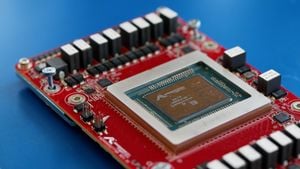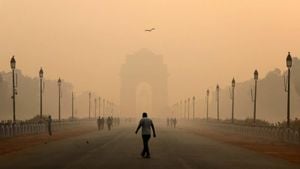The Palakkad assembly bypoll, set for November 20, has become the centerpiece of serious political maneuvering and rivalry among Kerala's major parties: the Left Democratic Front (LDF), the United Democratic Front (UDF), and the National Democratic Alliance (NDA). This battle has unfolded amid accusations of voter fraud, extensively stretching the limits of political strategy to sway the electorate.
With over 1.9 lakh eligible voters and intense campaigning, the political atmosphere has grown increasingly heated. The promises made by candidates reflect the pressing need to address local issues, but what has captured the most attention are the controversies springing from the campaigns.
The Election Commission reported taking significant measures against what it identified as fake voters. A list of individuals suspected of being improperly registered was prepared, with strict guidance for presiding officers on how to handle any of these individuals if they appeared to vote. The idea is to discourage fraudulent voting and maintain the integrity of the electoral process.
M.B. Rajesh, Kerala's Excise Minister and CPI(M) senior member, remarked on the legal avenues the party would explore to challenge any suppression of voters. Meanwhile, candidates from Congress and BJP condemned the CPI(M) for attempting to intimidate genuine voters amid their accusations against each other's voter registration tactics. Congress candidate Rahul Mamkootathil questioned how such fraudulent names found their way onto the rolls if the election officials were truly doing their jobs. His campaign has drawn significant attention, particularly remarks he made about systemic failures.
The claims of fake voters have served as the backdrop to the campaign, with accusations flying thick and fast. Each party is trying to position themselves as the defender of voter rights against supposed underhanded tactics from the others. K. Krishnakumar of the NDA questioned whether the CPI(M) trusted the state’s own law enforcement, insinuated through his campaign rhetoric and strategic narrative.
Adding another layer to the political narrative, controversial advertisements published by the CPI(M) led to backlash from the UDF, who labelled them as communal and divisive. Reacting to this, Congress leaders declared these moves were representative of CPI(M)'s desperation as they sought to regain lost ground, especially after former BJP member Sandeep Varier joined the Congress and brought his following with him.
The advertising campaign itself became the focal point of charged discussions, with Congress accusing CPI(M) of attempting to mislead the electorate with twisted narratives around Varier's previous statements when he was part of BJP. The CPI(M) aimed to paint Varier’s transition to Congress as hypocritical, citing his past rhetoric.
The stakes are high for all contenders. Following the bypoll necessity after the resignation of Congress MLA Shafi Parambil, strategic miscalculations could cost significant local support. Each party’s fear of losing the minority vote has intensified, significantly leading to accusations of communal tactics from all fronts.
Polling day preparation sharpened the atmosphere even more, engaging voters' emotions and loyalty at the neighborhood level, which both enhances community ties and lends itself to potential mobilization of disruptive propaganda just before the voting. With sensitive polling areas identified, heightened security measures are considered prudent, as authorities prepare for any fallout from the aggressive campaigning.
Many citizens are left pondering the potential impacts of the rampant campaigning. Will the strategies deployed by each party pay off, or will the stigma of controversies oversaturate the voter base to the extent of leading to voter apathy? With such high stakes involved and the broad spectrum of issues at play, only the upcoming polling day will reveal the true dynamics of power within Palakkad’s political arena.
While the campaign officially concluded, numerous stakeholders are readying themselves for election day. Final rallies and community outreach have drawn significant attention, with all sides displaying their supporters' energy and enthusiasm. The palpable atmosphere is reminiscent of major sporting events, where every gesture could turn the tide and possibly earn the prized votes needed to clinch the Palakkad assembly seat.
With all parties claiming trajectories of imminent victory, the Palakkad bypoll isn't just another election; it's symbolic of larger ideological battles playing out not only locally but across the state. The outcome will inform not only who secures power but also how tactics and strategies evolve for future electoral battles across Kerala. Voter turnout, particularly among traditionally lower-engagement demographics, will be one of the key factors to watch as they decide the fate of candidates and political allegiances alike.
Only time will tell how effective the concerted efforts of any side will be, but voters have pre-emptively registered their concerns and expectations about the candidates affecting their futures and their locality. A collective sigh of relief might only follow the vote counting later this week, as contenders prepare for whatever political turns lie ahead, all stemming from the high-stakes environmental of the Palakkad bypoll.



